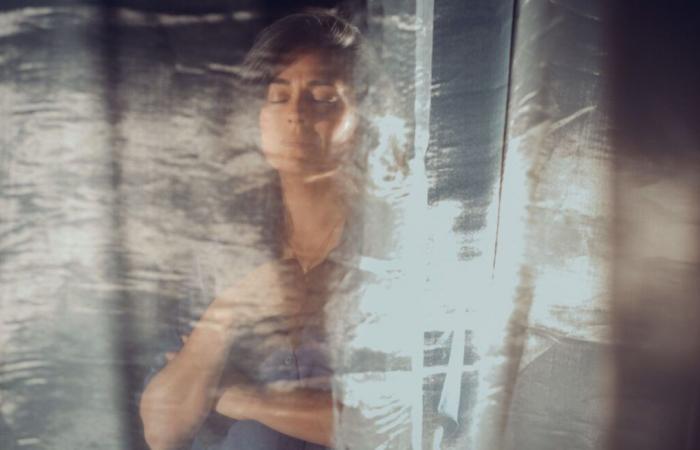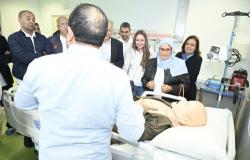ow do you mourn the loss of a father who is absent but still alive? It is this unusual question that actress Krystel Descary has always faced. In his self-fictional piece make deathcreated at Espace Go, it addresses this type of “unrecognized mourning”. “Everyone can experience unrecognized grief,” she explains: miscarriages, divorces, job losses…” In short, any situation of loss that is not socially recognized. “When society tells you that your mourning is not valid, you yourself do not recognize it as such. It took me a while to recognize that I was grieving. But I was completely dysfunctional, like someone in mourning, without knowing where it came from. »
Her show, which deals with mourning in the broad sense, is not therapeutic, indicates the one who previously co-wrote, with Édith Patenaude, The treesin 2009. “One of the steps to getting through unrecognized grief is often to make a work of it or to find meaning. So, the show wants to be a bit of a loop, or an offering. I want the paths I have followed to be useful. And, for me, it helped equip me to deal with mourning, but also with regard to my own death. This is what I want to offer to the spectators. »
The text follows the journey of Krystel (played by Laetitia Isambert-Denis) as she tries to establish a connection with her father, a man who returned to the wife from whom he had separated and who often disappears from his daughter’s life. At the same time, a thanadoula (played by the author herself) shares her knowledge on the stages of the end of life and the grieving process.
The piece comes from her discovery of this ancient profession, also called end-of-life companion or death midwife. Seduced by this work, Krystel Descary felt the desire to make a documentary and followed training as a thanadoula during the pandemic. Winner of the 2022 Paulette-Gagnon Prize from the Foundation for the Advancement of Francophone Theater in Canada, the creator received a scholarship which allowed her to do a residency at the Porte Parole company.
With the contribution of Marie-Claude St-Laurent as playwright, she reworked the form of documentary theater. The author rather describes her piece, informed by her research on the end of life, as “documented autofiction”: except for the character of the thanadoula, nothing is invented in the narrative. Even the scenes that never took place in his life start from real impulses or fantasies.
Krystel Descary therefore risks infusing it with a high level of intimacy. “I think I haven’t realized it yet,” she admits, laughing. I have my mother’s consent. But my existence was denied a lot, I was an unrecognized child. Even though there are letters proving that my father wanted a child, that he was happy with my birth, three months later he made my mother sign a letter releasing him from everything. And I think that the fact that my identity was not recognized had a lot to do with my privacy. So, to reveal a part of it is also to straighten out a part of my identity, or to celebrate it, even if it is not glorious, even if it lacked love and care. It’s about reclaiming that space. »
For a long time, she was ashamed of her personal history. “We are often ashamed of our bereavements. And the show is a bit of a recognition that there is no such thing as stupid or shameful mourning. Grieving has an active role in our evolution. » They help us move forward if we agree to live them. “So, for me, doing this show is a way of putting beauty where there has been a terrible lack of it. »
Humour
Crossed with a lot of humor, make death is not a morbid spectacle. “I really want people to come and laugh,” says Krystel Descary. They will be touched, they will think, they may be a little confronted. But humor is saving. »
Still, the play addresses our relationship with the Reaper. The author believes that we are “extremely uncomfortable” when faced with real, ordinary death. “And we often see death and illness as a failure. There is a great dichotomy between births and deaths, and yet, these are two passages that are very similar. But there is one that we celebrate and another that we hide. I believe that death is an important passage, which deserves to be underlined. Who deserves to be seen, in fact, honored. »
And we tend to live in denial of our inevitable end. “The problem is that we often start thinking about death, or our own death, when we are at the end of our lives. But now it’s too late to have deep thoughts. »
In reality, she observed during her own reflection on the subject, “the more you talk about death, the more you welcome it into your life, the more your relationship with life changes”. She gives the example of her research into green burials, a process without embalming that she now favors. “Immediately, my relationship with the Earth, and how I treat it, changed. For me, this moment [de réalisation] was very strong: thinking about your death also means thinking about the living things around you. Because it is the living who will finally welcome your remains. We are in a cycle. »
A call, therefore, for us to think about ways of “doing death differently”, collectively, while, more and more, this passage is devoid, precisely, of a collective dimension. “It becomes more and more individualized. Before, the dead were at the center of our living room, it was the community that took care of them. Here, we are a little lost of bearings. »
Ritual
Krystel Descary wanted “all the people who revolve around the show to have a direct link” with the theme of mourning. For director Marie-Ève Milot, whose brother died suddenly, this project would have been received as a reassurance. “It’s as if her personal life and her artistic life, for the first time, are one,” says the author. And Marie-Ève’s vision is to accompany the viewer. So that he can, in a certain way, also put aside one or more mournings. » And this, thanks to an original means, which Milot prefers not to reveal.
Carried by the music of Mykalle Bielinski, performed – the cast also includes Joanie Martel, Pier Paquette and Isabelle Vincent – on a stage covered with earth, the show itself orchestrates a ritual. It concludes with an act, of which we also want to keep the surprise, which will have allowed a member of the production to project his own mourning for his mother “and to make peace”. “And that’s what theater is for,” recalls Descary. It is the greatest ritual space we have and we underestimate it more and more. This is the invitation of the show: to take the room by storm and create a societal ritual space. »
For the author, who is still learning about her story by seeing it interpreted by others, make death takes the form of a “celebration of the end of a cycle, or of a rebirth”. The beginning of a stage more focused on writing for the artist who realized that she had wanted to become an actress, among other things, “so that my father would see me on his TV”.
The creation also marks a return to the metropolis for the Montrealer trained at the Conservatory of Dramatic Art of Quebec, who first played roles in the capital’s theaters, before successfully going into exile in Toronto for a decade. A professional trajectory also linked to his relationship with his father. “I started seeing him again and there was a lot of anxiety,” says Krystel Descary. Looking back, I realize that I needed to leave, to revisit my history. » And now that she has dealt with the loss of this fundamental connection, “it’s like I finally feel ready to come back.” I think a loop ends. It seems like I finally feel like me.”






